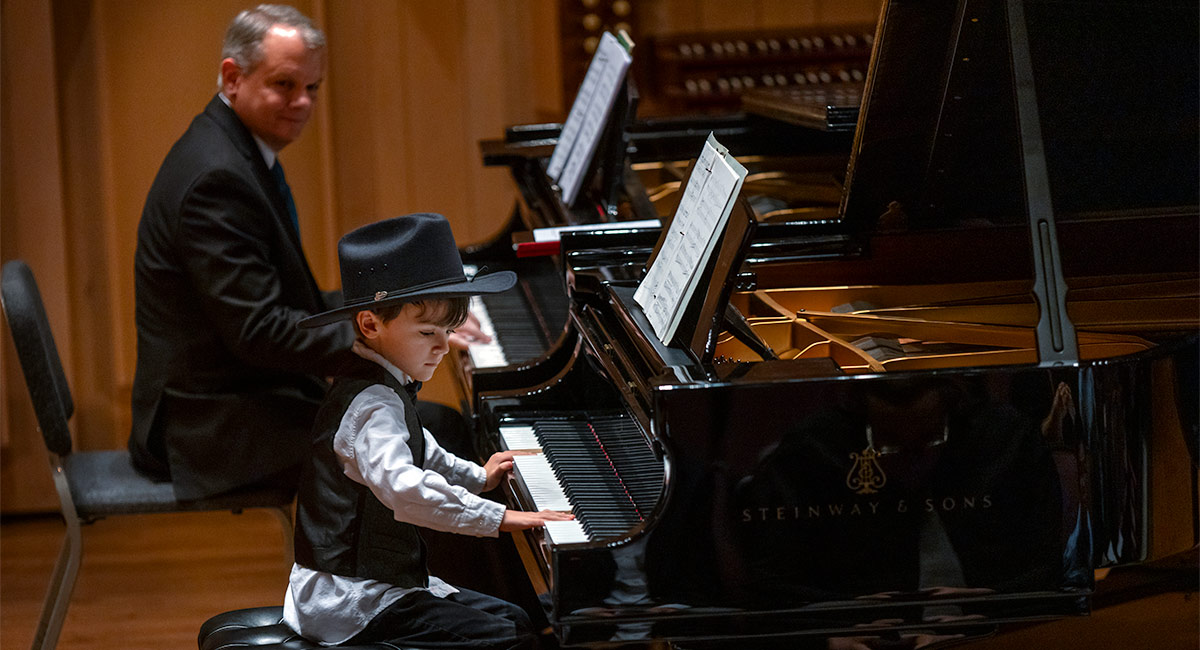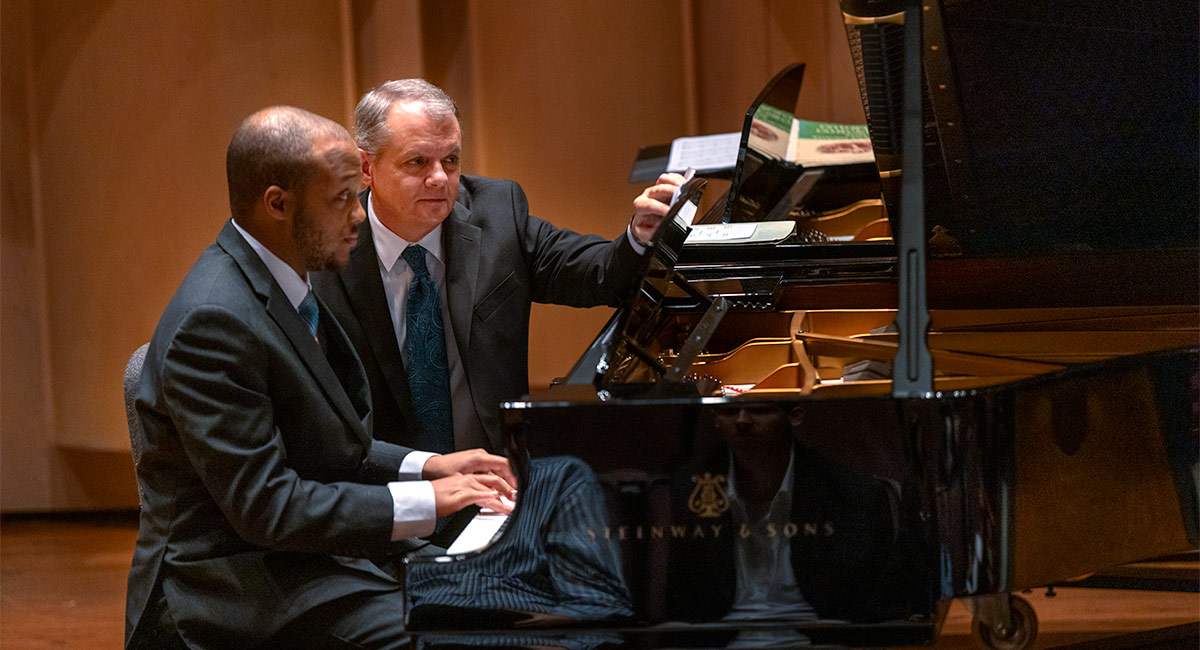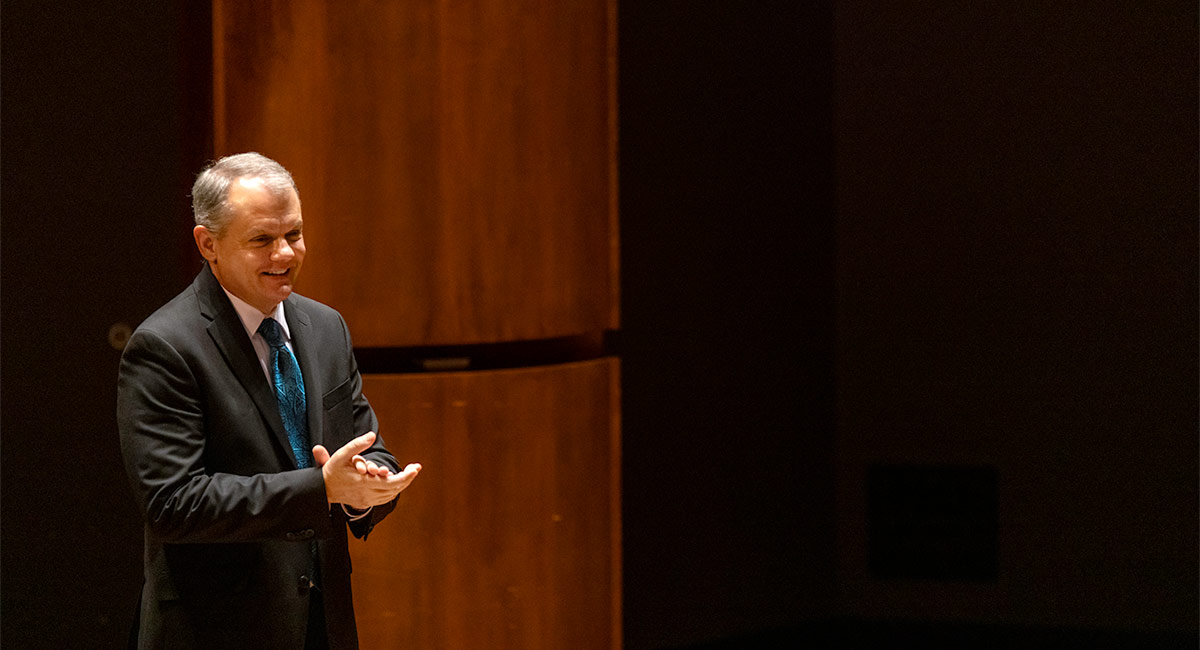Loop of piano recital on stage
Two pianos sit next to each other on the stage at the School of Music Recital Hall — one for the student; one for the teacher.
Proud parents, grandparents, siblings and friends fill the audience, cellphone cameras at the ready. One by one the students stride across the stage to the piano, sneak a peek at the crowd, sit down and begin to play.
At this end-of-the-semester recital, each of these students with disabilities performs their repertoire, along with a little improvisation for the audience or some of their own compositions.
And Scott Price, Carolina Distinguished Professor of Music at the University of South Carolina, is right beside them, whispering a word of encouragement, accompanying the student on a duet and filling the stage with a feeling of serenity.
This fall will mark the 25th year of the Carolina LifeSong Initiative, a program started by Price that provides piano lessons and creative music-making experiences for students with autism and other disabilities. It’s a program that has made Price an internationally known expert on teaching music to students with disabilities. The majority of the students are on the autism spectrum, and he also has taught students with visual and hearing impairments, Down syndrome, ADHD and various types of developmental delays.
“Our philosophy is that we try to help everybody regardless of their unique needs, and to learn from them how to become better teachers,” says Price, who also is the coordinator of piano pedagogy and teaches USC graduate students how to teach piano to this population of students.

Getting started
The program that has helped teach piano to dozens of Midlands students started with a phone call to Price at USC’s School of Music.
A piano dealer in town had been approached by the parents of a young girl who was blind and disabled — and who had a marked aptitude for music. The girl’s parents were wondering if anyone would be able to work with their daughter. The piano dealer said he had a friend at the university who might be the right person for the job. He called Price.
“She was my first student,” Price says. “It turned out that she was born nearly four months premature — blind from birth, profoundly autistic, profound developmental delays. But on the other end of the spectrum, her music aptitude was extremely high. And she had taught herself how to play the piano and was playing all kinds of arrangements of every song that she heard.”
At that time there was limited information on teaching piano to students with autism and other disabilities. There weren’t many services available either, so parents would connect with each other. And parents were spreading the word about Price at USC.
“One student turned into two, that turned into three. And now my entire pre-college class are students with autism,” he says.
It also has brought graduate students to USC specifically because they want to do research and learn best practices for teaching piano to students with autism, dyslexia, ADHD or other disabilities.
“It has filtered into the profession now, to the point where there are people who really want to specialize in this kind of work,” Price says.

Student stories
Each semester Price offers lessons to nine to 12 students, some as young as 4 all the way into their late 20s. The students and their parents come to weekly lessons, and each semester ends with a recital performance.
Wilfred Rogers, an assistant principal at the alternative high school in Richland School District One, takes his son Stanton to lessons on the USC campus each week. He says Price has the temperament and patience to work with students with disabilities, a population often overlooked in day-to-day activities.
Stanton Rogers has been taking lessons with Price since he was 7 years old, soon after he was diagnosed with autism. He is now 24.
“Back then, 20 years ago, we really didn't know how to approach it, what it entailed or anything,” Wilfred Rogers says. “But we did know that we needed to do something to keep his mind stimulated.”
The Rogers family heard about Price’s program from the parent of another student with a disability. The connection between Stanton Rogers and Price has kept them coming back for 17 years.
“We keep him in because of the bond he has with Dr. Price and the brain exercises of playing the piano help him out as far as some of his other skills,” Wilfred Rogers says. “He's not a maestro by any means, but he likes it. He really likes it. And we like him doing it.”
He also likes seeing his son and the other students perform each semester.
“Once you have a special needs child, you realize that they have interests and wants and dreams,” Rogers says. “You see these kids’ eyes light up when they're on stage. It's touching to see them getting their chance to shine. To them, they’re on the stage at Carnegie Hall.”
At 5 years old, James Russell is one of Price’s youngest students. At this spring’s recital, he wore a cowboy hat, vest and boots. His feet didn’t reach the piano’s pedals.
His mom, Ashley Berendzen, and dad, Charles Russell, figured out their son could play the piano by ear when he was just 2½, about the time they realized James is autistic. At 3 years old, he would play for six hours a day by himself, sometimes getting up in the middle of the night and finding his way to the keyboard.

“I started looking for resources right then,” Berendzen says. “I was looking for what I could do to help him reach his potential.”
She connected with Price, who began teaching James when he was 3.
“Dr. Price has a really good rapport with him, which is really important with my son,” she says. “Dr. Price has engaged him. He’s caught my son’s respect, attention, heart – all of those things.”
He takes lessons twice a week, and, while James was already able to play by ear, he now is getting formal guidance in how to understand, read and play music.
“We wanted him to learn correctly because he wasn't using proper fingering position, and I didn't have the vocabulary to explain to him,” Berendzen says. “He understands somehow. He just kind of intuitively understands concepts. But Dr. Price is able to put terminology and name these concepts that James understands.”
She also appreciates what Price does to cater to each student’s needs and bring out each person’s creativity.
“And I think that's a huge part of what he does. Because of that, there's no limit,” she says. “He's in good hands with Dr. Price, I know that.”
For Price, teaching piano to students with disabilities – along with creating curriculum and textbooks and presenting research around the world – may not have been what he expected as he started his career.
“I knew that the kids were gifted, and I believe every child is brilliant. They needed somebody there to help them.” Price says. “I think 25 years has gone very quickly. Every student has responded beyond my wildest expectations."